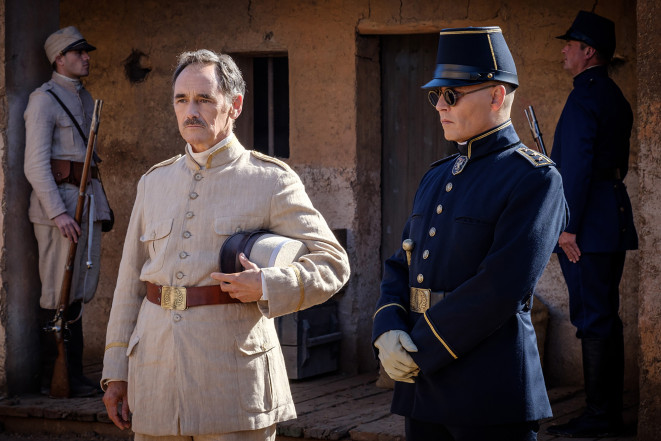
There are a handful of novels said to be fundamentally unfilmable, “A Confederacy of Dunces,” “Lolita” and “Dune” among them. Many of them have, of course, been made into films anyway.
I’d nominate “Waiting for the Barbarians” for that list after seeing Colombian director Ciro Guerra’s adaptation of J.M. Coetzee’s 1980 novel, even with the substantial talents of Oscar winner Mark Rylance in the lead role and Coetzee himself, a Nobel laureate, as screenplay author.
That said, if you’re into seeing Johnny Depp and Robert Pattinson play truly despicable government officials, have I got a movie for you!
In this allegory about the evils of colonialism, Rylance is the unnamed magistrate of a fictional desert town in an undefined, but clearly older, era. The windswept village maintains a distant but respectful relationship with a community of desert-dwelling nomads, also called barbarians by the locals. These outsiders are the primary focus of Colonel Joll (Depp), a glaringly sinister representative of the Empire who shows up one day to surveil life in the frontier town.
He’s on a mission, he says, to find out whether barbarians are planning a war on the Empire, to the deep surprise of the magistrate. Joll sets about torturing two nomads imprisoned for a minor stealing offense, and despite Depp’s masterful delivery of a monologue about savoring the moment a prisoner breaks, there’s precious little subtlety as events snowball quickly toward larger and broader crimes against humanity.
Would it surprise you that Colonel Joll’s forces mount an expedition into the desert, bringing back a chain gang of bloodied barbarians who are publicly tormented in the town square? Or that the townspeople are co-opted into accepting, and even aiding in, their torture? A flinty-eyed Pattinson shows up midway through as Officer Mandel, who savors his sadistic work even more than Joll, and soon the Magistrate is being treated as horribly as the captives.
Guerra, with cinematographer Chris Menges, renders the town and its stark, hot landscape as surreal and otherworldly, a gorgeous yet ominous dream. But the director, whose 2018 film “Birds of Passage” was similarly beautiful and brutal, leaves his audience too little time to ponder how the mass transition to inhumanity happens. One day everything’s fine, the next it’s a town full of would-be Nazis.
At least there is a little more room for nuance in the relationship between the Magistrate and the Girl (Gana Bayarsaikhan), a hobbled and blinded torture victim he rehabilitates and eventually, reluctantly, returns to her tribe. Are his actions selfless, or did he crave a nubile dependent? A conversation with a kindly cook (Greta Scacchi) suggests the latter, even if the Magistrate doesn’t understand his own actions as dehumanizing.
The final moments of “Waiting for the Barbarians” are some of its best: The final shot, and what it says about the inevitable legacy of the Empire’s actions, still lingers with me.
There’s never a bad time to study the lessons of history, particularly the chronic recurrence of atrocities against indigenous peoples. But the blunt nature of “Waiting for the Barbarians,” and its hasty slide into misery-porn, feels too pat to be a useful accompaniment to reality. Sometimes it really is better to just read the book.











